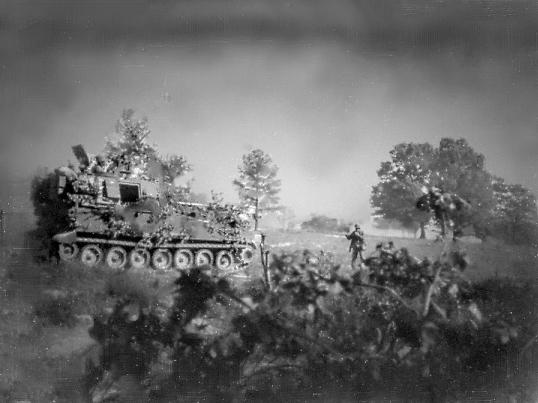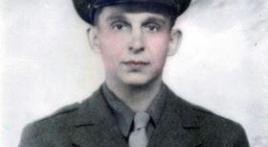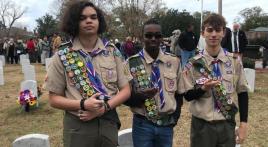A few months after Hitler had promised Holland neutrality, German paratroopers invaded our country at night. This happened while I was only a few months old. Therefore most of my recollections about World War II date back to the end of the war or from 1944. We were having a very difficult time because when Dad our breadwinner was captured, and when he did not return from a German concentration camp, the odds of survival were against us. Mom was forced to place her kids with various family members, and lacking my Dad’s income, she visited Dutch farms to beg for food. During the notorious Dutch “hunger winter” of 1944 to 1945, she managed to collect enough food for us to survive.
In September 1944, Dutch railway employees struck in an effort to assist liberating Armies that were trying to capture bridges across Holland’s main rivers. Montgomery’s thrust north towards Arnhem depicted in the film, A Bridge Too Far failed and the allied armies came to a grinding halt south of our main rivers. The German administration retaliated by placing an embargo on all food transports to the western Netherlands. When the embargo was partially lifted in early November 1944, and some food transports were allowed over water, an unusually early and harsh winter had set in. The canals froze over and became impassable for barges. Also gas, electricity and heat was turned off. Roughly 30,000 Dutch died from starvation, exhaustion, cold and disease.
In the hunger winter we literally fed on anything that could be found. We learned that sugar beets, turnips and even tulip bulbs could stem hunger. Our streets were empty of cats and dogs. Butcher shops advertised “rabbits for sale,” but we learned that a cat’s body cannot be anatomically distinguished from a rabbit’s body. In spite of those food substitutes many people died from hunger. The Germans had flooded our normally productive agricultural lands to stop Montgomery’s British-Canadian forces from crossing the Rhine. Our food was rationed and rations shrunk dramatically as the winter progressed. Even the black market was running out of food.
My Dad was employed in a prison and helped two Jewish men who were undoubtedly destined for a gas chamber, to escape from prison. He was betrayed by a fellow employee and taken prisoner himself. I recall scary experiences in trying to get Dad released, our farewell from him on a train station destined to a German concentration camp and V-1s flying over our homes, some of which landed far short of London and destroyed a neighborhood. I also remember when our living room exploded from joy when a clandestine radio broadcast announced that the allies had landed in Normandy. Today the Dutch are still extremely grateful for the liberation of their country and each year the graves of fallen U.S. service men are draped with flowers.
WWII was one kind war where allied civilian populations were united in a common goal of freeing conquered Europeans from an evil regime. It was a worthwhile cause and few people questioned the need for this war. The successful overthrow of the German regime allowed my family and me to survive and emigrate to the U.S. where a new life awaited us.
By contrast there was no unanimity about the need for our intervention in the Vietnam War. Robert Kennedy advised his brother, John Kennedy [JFK] that we needed to withdraw our support unless the Vietnamese could sort out their own government. Unfortunately, JFK thought he might be able to strengthen the GVN and their military at the same time. JFK was an optimist; the GVN’s bumbling efforts to govern were torn by rivalries among the dissident groups of military officers, Buddhists, and Catholics. This chaotic approach actually furthered the influence of the Viet Cong and the North Vietnamese who presented a united front and were seen to be supportive of the common people. As the war progressed and photographs of our casualties appeared daily in our newspapers, our population became highly divided as well. Even among our troops the ironies of this war became increasingly visible.
What did the average U.S. soldier experience when fighting in Vietnam? For the uninitiated, imagine fighting for the most powerful military in the world and being tasked to fight a guerrilla that had to be searched out in unfamiliar jungles rife with many thousands of miles of underground tunnels that allowed him to appear and disappear at will. In President Kennedy’s words, the enemy was everywhere and at the same time nowhere. Imagine also that the guerrilla was supported by the local population and that this enabled him to blend in with civilians whenever opportune. The guerrilla wore the same black clothes [we called them “pajamas”] as the farmers and hamlet dwellers. His weapons came from China, Russia and Czechoslovakia, countries that we were not at war with.
When we saw what looked like a unit of Vietcong, we had to make sure that they were actually Vietcong. We could not just fire at them, but we needed to obtain clearances from district officials to ensure that we were not killing ordinary farmers or villagers because only the North Vietnamese army wore a clearly identifiable uniform. Communications with South Vietnamese district leaders was sometimes difficult and we could not always get permission to fire in a timely manner. The potential bounties would invariably have spotted us and escaped since we only were allowed to fire spontaneously when we were fired at and/or when we rode into an ambush. The enemy, whether guerrillas or North Vietnamese army units, were often able to engage us when most opportune for them; hence their successes in ambushes. We had learned some effective counter tactics, but we always took casualties. We made concerted efforts [with some widely publicized exceptions, such as in the My Lai massacre] to avoid civilian casualties, because it was essential for us to win over the South Vietnamese people. At the time we had no idea that this was probably a fool’s errand.
One significant issue always considered in any type of war is how much collateral damage is acceptable. Initially in WWII, the U.S. bombed mostly military targets in day time and at low altitudes and suffered many casualties, while the British bombed from safer high altitudes at night with less scruples at avoiding civilian casualties probably because they had endured many bombing raids on their own cities and because they thought it also would adversely affect German morale. Even as late as July 21, 1944 Eisenhower ordered the Eighth Air Force to use only precision bombing of military targets which resulted in the destruction of oil facilities and bridges that effectively kept most of the Luftwaffe grounded on D-day and kept panzer units tied up at river crossings when these could have been used to stop the allied invasion of France.
However our Air Force eventually used napalm and atomic bombs to destroy cities in both Germany and Japan causing hundreds of thousands of civilian casualties. In Japan there were not many industrial targets left and military targets were often co-located near large cities. Truman had hoped to avoid killing women and children but he judged that he needed to use the atomic bomb to impress the ever aggressive Russians in East Europe and he thought that it would save up to a quarter of a million American casualties.
To appease newspaper reporters and arm chair soldiers back home, we theoretically should never kill civilians, even though they may be abetting the enemy. Recently the Washington Post reported that against oil carrying vehicles in support of ISIS we first drop leaflets to warn the vehicle drivers, we then strafe the trucks by firing warning shots and finally make one last run to destroy the military objectives. This does not make sense to me at all. One well directed ground fired missile can easily take down a multi-million dollar fighter plane and its pilot. And for what? To spare civilians who are transporting ISIS oil and are probably supporting ISIS combatants. In a 1967 battle in Vietnam for two days about 215,000 leaflets were airdropped into the Iron Triangle to warn civilians [and incidentally the VC] that a massive assault would be launched. As a result we let thousands of VC escape and we managed to kill only a few VC stragglers.
I think we have gone way overboard in trying to spare civilians, while placing our military objectives are at risk. When we go to war we must be allowed to use maximum force and the best tactics to achieve victory all within a clear set of moral standards.
After WWII and also after the Korean conflict, our soldiers returned from the war zone with ticker tape parades and an appreciative populace. There is nothing that civilians and our families appreciate better than when we are victorious. Because we could not claim victory in Vietnam primarily because our tactics were too restrained our people thought it OK to blame the men in uniform. I personally experienced some this when after a swift flight across the Pacific Ocean by way of Hawaii, my plane landed in San Francisco and I disembarked dressed in my class “A” uniform. It seemed strange to be back in the U.S., but I felt pleasantly surprised for my newly won ribbons that I now proudly displayed on my chest. I finally felt like one of the old timers who I had so often admired. Even with my somewhat degraded hearing from living around howitzers for a few years, I clearly heard someone yelling at me. An airline clerk called out, “Hey soldier boy, why don’t you get your ass over here into this queue for your flight to Los Angeles.” I could not believe my ears, but I kept my anger inside. I felt humiliated by this obnoxious kid, who apparently had an axe to grind with the military.
In the late 1960s, our society had gone ballistic and I was caught in the middle. In addition to student riots at different universities, the burning of draft cards and the protests in front of the White House fence, where shameless politicians caught the limelight by throwing our nations honors [purple hearts and other medals] across the fence, while racial tensions were at an all-time high. My first job after my military service was in the heart of Washington DC, where I witnessed the Mall filled with many tents and garbage and where I had to navigate streets that were lit up by stores on fire, while people were running around with stolen goods. I thought to myself what is wrong with our society, how can we ever reconcile those faithful soldiers who did their duty under the most trying circumstances while the rest of our society is creating chaos and where protesting students are indefinitely deferred, while draft dodgers are fleeing across our borders.
From this immigrant’s perspective we need a new commitment to teach our people, starting in our schools that when we go to war, everyone, not just an all-volunteer force, has a duty to country and ought to have skin in the game. In my humble opinion, when we are at war every young person should be required to contribute, whether that means by reinstating the draft and requiring service in an expanded job corps or by levying additional taxes to ensure that our military stays strong and our military personnel will have needed protection, while the wars are conducted by our military leaders in the most effective ways. Then when our soldiers come home victoriously they will be better appreciated. Even today when less troops are in harm’s way we still have major responsibilities to take care of the disabled and traumatized. After multiple deployments these warriors need to be restored and properly taken care of. We owe it to them and their families. It is time that we do so no matter what the costs.

From Nazi-occupied Holland to the jungles of Vietnam
Vienna, VA
December 14, 2015
Submitted by:
Leo Deege



